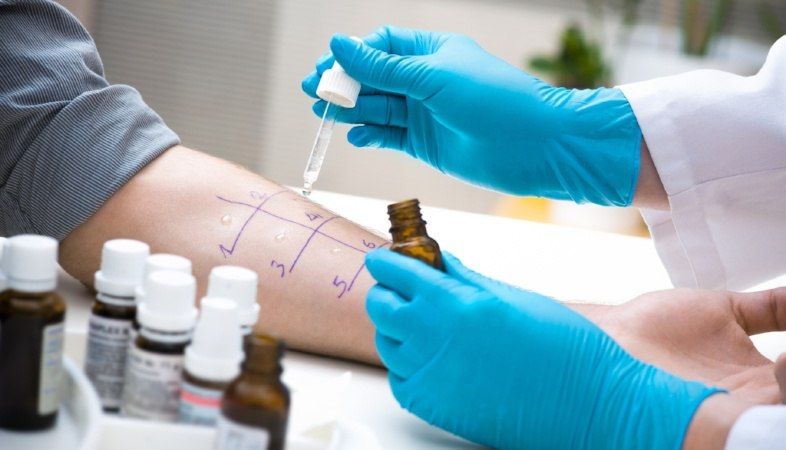May 24th, 2017 | 2 min. read

Struggling with allergies is an unfortunate but very common circumstance. To determine what is causing allergy symptoms, patients may undergo allergy testing. This testing can be done in various ways; blood, stool and skin or patch tests are all ways to test for allergens.
Allergy patch testing is used to identify specific allergens that cause dermatological allergic reactions.
When you come into contact with an allergen, your body triggers white blood cells called lymphocytes, to combat these allergens. That’s why you may experience rash, swelling or eczema when you come into contact with allergens that cause a dermatologic reaction.
An allergy patch test tries to safely recreate this sensitivity to specific allergens, to find out what causes your skin allergy symptoms. Because the allergy patch test recreates allergen sensitivity on a very small scale, many allergens can be tested at once.
Always consult with your doctor to determine if allergy patch testing is right for you. Allergy testing is often recommended when OTC treatments are not effective. Your doctor may recommend allergy patch testing if you have persistent eczema or chronic dermatitis that doesn’t go away despite treatment. If you suffer from chronic dermatitis and work in a high-risk occupation, like the healthcare/dental industry, cosmetology or even plastics manufacturing, you may also consider allergy patch testing.
Allergy patch testing may also be recommended if you once had a dermatologic reaction to an allergen, it went away, and has come back without a known cause. For example, you may have a nickel allergy that causes dermatitis around your wrist where your watch is located. When you remove the watch, the dermatitis clears up. Months later, the area on your wrist becomes irritated again, even though you stopped wearing a watch. This could have been triggered by wearing earrings containing nickel, which can cause the rash to appear at the site of the watch.
Allergy patch testing might show that you’re still allergic to nickel. With your doctor, you can determine what is causing the allergic reaction, even if you may not be aware that you’re coming into contact with the allergen.
Now that we've answered what is an allergy patch test, it's time to determine what next steps you should take. For allergy symptoms like itchy eyes and runny nose, over the counter allergy medicines may significantly help reduce symptoms. For skin reactions, like eczema and dermatitis, these medicines will not provide relief. For skin-related allergies, it’s best to schedule an appointment with your primary care provider, who can help determine if allergy patch testing is right for you.
With our twenty-four hour access and patient-driven approach to medical care, a PartnerMD physician can help you find relief from allergy symptoms.
Topics: